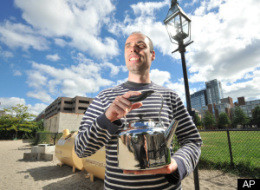In Kenya, selling human waste could revolutionize sanitation
Working directly with residents of Mukuru, one of Nairobi's largest slums, Sanergy has developed a promising new method to improve sanitation through low-tech, low-cost toilets that create organic fertilizer.
By Marie von Hafften, Global Envision / March 17, 2014

Dealing with human waste has become a health crisis in many poor communities, but residents of a Kenyan slum have found a solution that turns poop into profit. Working directly with residents of Mukuru, one of Nairobi’s largest slums, an MIT spin-off company called Sanergy has developed a promising new method to improve sanitation. Instead of promoting sanitation through education, Sanergy has addressed the core reason why many residents must still defecate in pits or in the street: a lack of access to toilets. But contrary to the idea behind last year’s Reinvent the Toilet Challenge by the Gates Foundation, Sanergy co-founder David Auerbach says that access to innovative toilets alone isn’t enough to spread sanitation practices.
“When it comes to sanitation, it’s no longer a question of, ‘Can you bring someone a good toilet?’” said Auerbach. “If that’s the answer we would have already solved it. “You need to address the entire sanitation value chain to solve the challenge,” he continued. Sanergy’s toilets are low-tech and low-cost, but they have a key feature: They come with removable waste cartridges. Local entrepreneurs buy and operate the toilets, charging users a small monthly membership fee. Sanergy then collects the waste and processes it into organic, sell-able fertilizer. Soon the company plans to process the waste into biogas, biochar and several types of plastic, as well.
Creating business relationships means that toilet operators earn steady income from their investments, and waste treatment pays for itself. It benefits people you would expect like the toilet users, who now have access to a clean and private space to go to the bathroom, and people you wouldn’t, like the farmers who pay less for the processed, organic fertilizer. Around the world, a lack of sanitation puts 2.5 billion people at risk of diseases like dysentery, cholera, typhus fever, and typhoid. Every year 1.6 million children die from preventable, sanitation-related diseases. A lack of clean toilets and clean water is “a compound magnifier of poverty, ill-health, and mortality,” said U.N. General Assembly President John Ashe.
Sanergy grew out of a MIT class on building entrepreneurial ventures in developing countries. When students learned the depth of the global sanitation problem, they saw a business opportunity. Human waste, they believed, didn't have to be waste at all. Sanergy’s answer is "no." Since opening its first toilet for business in 2011, the company has installed 330 toilets, collected 1,800 tons of waste, and created 350 jobs in Mukuru, an area with 40 percent unemployment.
more at: http://www.csmonitor.com/World/Making-a-difference/Change-Agent/2014/0317/In-Kenya-selling-human-waste-could-revolutionize-sanitation
CaliforniaPeggy
(149,629 posts)MADem
(135,425 posts)
Dog poop is lighting a lantern at a Cambridge dog park as part of a monthslong project that its creator, artist Matthew Mazzotta, hopes will get people thinking about not wasting waste.
The "Park Spark" poop converter is actually two steel, 500-gallon oil tanks painted a golden yellow, connected by diagonal black piping and attached to an old gaslight-style street lantern at the Pacific Street Park.
After the dogs do their business, signs on the tanks instruct owners to use biodegradable bags supplied on site to pick up the poop and deposit it into the left tank. People then turn a wheel to stir its insides, which contain waste and water. Microbes in the waste give off methane, an odorless gas that is fed through the tanks to the lamp and burned off. The park is small but has proven busy enough to ensure a steady supply of fuel.
Dog owner Lindsey Leason, a 29-year-old Harvard student, said she was all for seeing poop in a new light as she watched her two dogs play at the park.